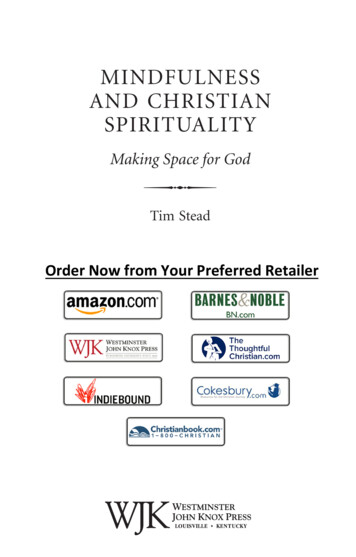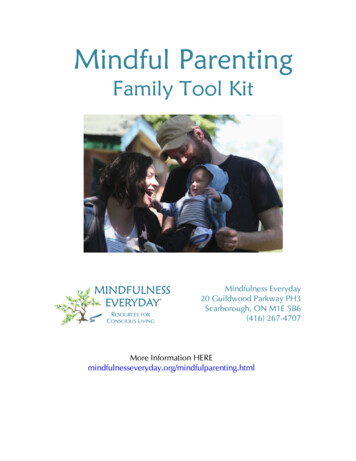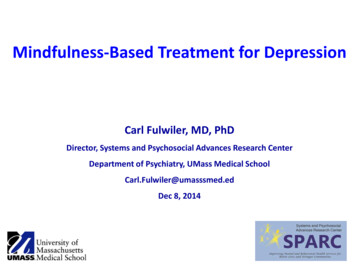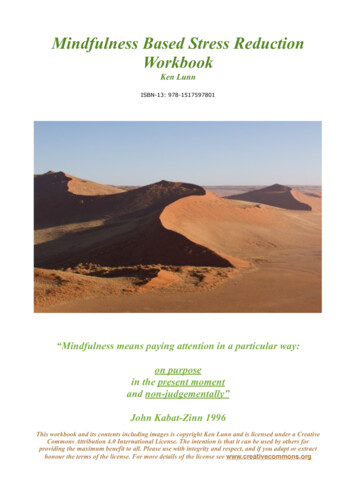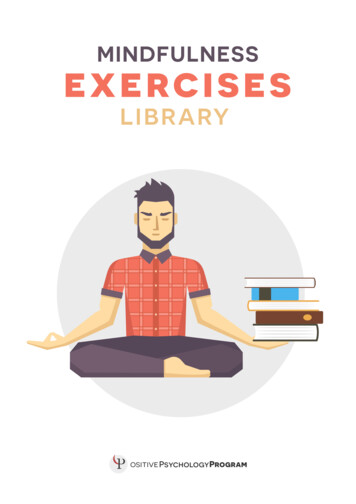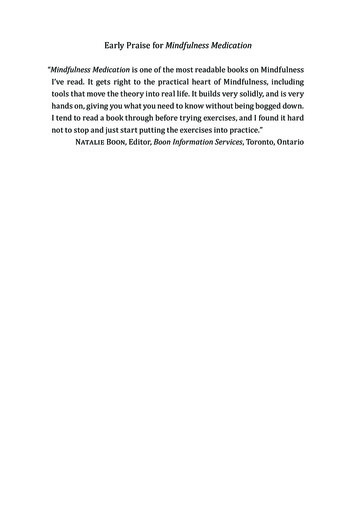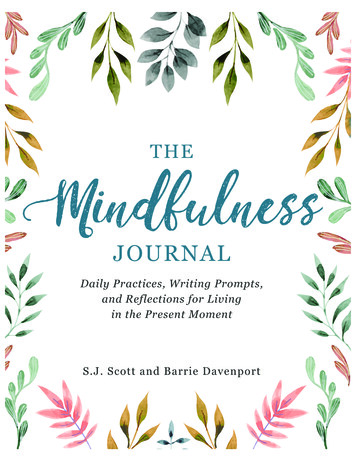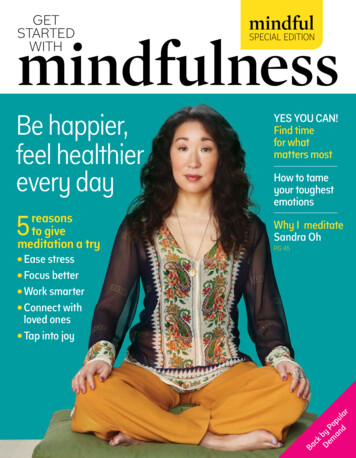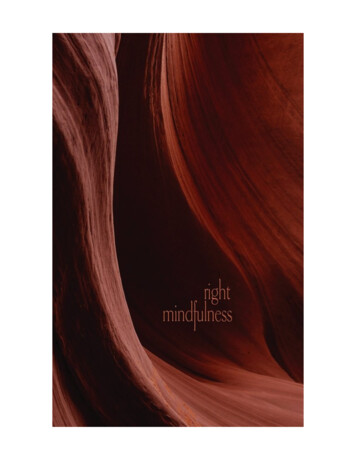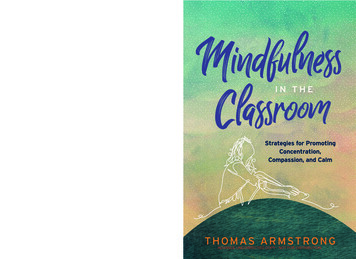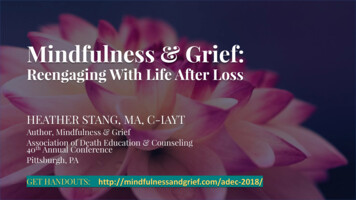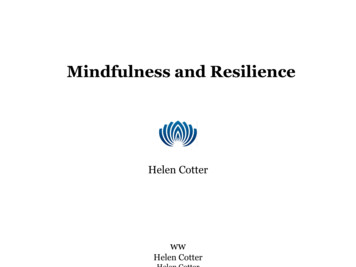
Transcription
Mindfulness and ResilienceHelen CotterwwHelen Cotter
What is mindfulness?“Mindfulness means paying attention in a particular way: on purpose, in the presentmoment, and non-judgementally.” Jon Kabat-Zinn“Awareness of present experience with acceptance.” Ron Siegal“Mindfulness is simply being aware of what is happening right now without wishing itwere different; enjoying the pleasant without holding on when it changes (which itwill); being with the unpleasant without fearing it will always be this way (which itwon’t).” James Baraz
Why practice mindfulness?Research shows that a regular mindfulness practice can:- reduce stress, anxiety and depression- improve memory and sleep- increase mental and physical stamina- increase capacity to cope with chronic pain- increase resilience
Research PublicationsSource: American Mindfulness Research Association (AMRA)
The practice of mindfulnessFormal practice- sitting meditation- walking meditation- body scanInformal practice- awareness of present moment experience during daily activities
Mindfulness is not- positive thinking- just a relaxation technique- trying to empty your mind- going into a trance or ‘zoning out’- a quick fix
Breath awareness practice
Establishing a practice“Mindfulness isn't difficult, we just need to remember to do it.” Sharon SalzburgFormal practiceChoose a regular time and place to meditateLet others know you don’t want to be disturbedTurn off your phone!Meditate with othersAttend a class or a courseInformal practiceChoose a daily activity to practise mindfully e.g. drinking a cup of tea, washing up, brushing your teeth, havinga shower, eating lunch, going for a walk.Identify ‘mindfulness bells’ or reminders to practice in your day e.g. phone ringing or buzzer call, sitting downat your desk, walking through the doorway of a patient’s room, red traffic lights on the drive to and from work.
Can you just be here now?
The Tricky Brain by Dr James KirbyCompassionate Mind Foundation
Emotional Regulation Systems by Professor Paul GilbertCompassionate Mind Foundation
“It is remarkable how liberating it feels to be able to see that your thoughtsare just thoughts and that they are not 'you' or 'reality.' For instance, if youhave the thought that you have to get a certain number of things donetoday and you don't recognize it as a thought but act as if it's the 'the truth,'then you have created a reality in that moment in which you really believethat those things must all be done today.” Jon Kabat-Zinn
In effect, the brain is like Velcro for negativeexperiences, but Teflon for positive ones. Thatshades “implicit memory” – your underlyingexpectations, beliefs, action strategies, andmood – in an increasingly negative direction.Rick Hanson - Hardwiring Happiness
“Neurons that fire together wire together. Mental statesbecome neural traits. Day after day, your mind isbuilding your brain. This is what scientists callexperience-dependent neuroplasticity.”“By taking just a few extra seconds to stay with apositive experience—even the comfort in a singlebreath—you’ll help turn a passing mental state intolasting neural structure.”Rick Hanson - Hardwiring Happiness
Taking in the goodA practice by Rick Hanson Look for positive facts, and let them become positiveexperiences Savour the positive experience- sustain it for 10-20 seconds- feel it in your body and emotions- intensify it Sense and intend that the positive experience is soakinginto your brain and body registering deeply inemotional memory
“Taking in the good is not about putting a happy shiny face oneverything, nor is it about turning away from the hard thingsin life. It's about nourishing well-being, contentment, andpeace inside that are refuges you can always come from andreturn to.”Rick Hanson - Buddha’s Brain
Resources for Mindfulness and ResilienceBooksMindfulness: A Practical Guide to Finding Peace in a Frantic World by Mark Williams and Danny PenmanMindfulness for Health: A Practical Guide to Relieving Pain, Reducing Stress and Restoring Well-Being by VidyamalaBurch and Danny PenmanThe Mindful Way Through Depression by Mark Williams, John Teasdale, Zindel Segal and Jon Kabat-ZinnThe Mindful Way Through Anxiety by Susan M. Orsilly and Lizabeth RoemerMindful Eating by Jan Chozen BaysThe Sleep Book by Guy MeadowsHardwiring Happiness by Rick HansonResilient by Rick HansonMindful Compassion by Paul Gilbert and ChodenAppsHeadspace (for daily led meditations)Gratitude
Questions and enquiries welcomewww.helencotter.comemail: hello@helencotter.comtelephone: 07815 697911
Mindfulness for Health: A Practical Guide to Relieving Pain, Reducing Stress and Restoring Well-Being by Vidyamala Burch and Danny Penman The Mindful Way Through Depression by Mark Williams, John Teasdale, Zindel S
